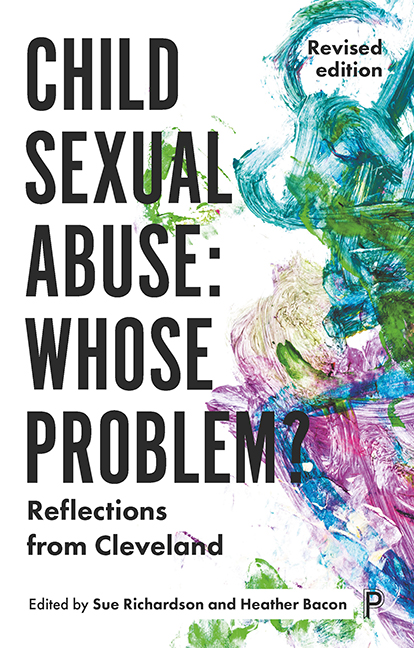Book contents
- Frontmatter
- Dedication
- Contents
- List of tables and figures
- List of abbreviations
- Notes on the editors and contributors
- Acknowledgements
- Preface
- Introduction:Why Cleveland still matters: connections with a new era
- one From Colwell to Cleveland: 1973 to 1988
- two A framework of belief
- three The medical diagnosis of child sexual abuse: the paediatrician’s dilemma
- four After the medical diagnosis: everyone’s dilemma
- five The continuum of disclosure
- six Seen but not heard: the children of Cleveland
- seven The unwanted message: child protection through community awareness
- eight Questions not answers: progressing the debate
- Conclusion:Thirty years later: how far have we progressed?
- Appendix
- References
- Index
Introduction:Why Cleveland still matters: connections with a new era
Published online by Cambridge University Press: 13 April 2022
- Frontmatter
- Dedication
- Contents
- List of tables and figures
- List of abbreviations
- Notes on the editors and contributors
- Acknowledgements
- Preface
- Introduction:Why Cleveland still matters: connections with a new era
- one From Colwell to Cleveland: 1973 to 1988
- two A framework of belief
- three The medical diagnosis of child sexual abuse: the paediatrician’s dilemma
- four After the medical diagnosis: everyone’s dilemma
- five The continuum of disclosure
- six Seen but not heard: the children of Cleveland
- seven The unwanted message: child protection through community awareness
- eight Questions not answers: progressing the debate
- Conclusion:Thirty years later: how far have we progressed?
- Appendix
- References
- Index
Summary
Editors’ summary
This new introduction makes the connections between the Cleveland crisis as a lost opportunity for the protection of abused children and current unresolved practice issues, along with increasingly recognized issues such as historical abuse. Drawing on a wide range of research, we challenge the ethos of the last three decades that leaves sexually abused children vulnerable in the face of investigative and evidential hurdles. By detoxifying the myths surrounding Cleveland and shedding light on what actually took place, we create a changed narrative and a context for continuing debate about the dilemmas facing professionals in the field and the communities in which they work.
We have learned during the Inquiry that sexual abuse occurs in children of all ages, including the very young, to boys as well as girls, in all classes of society and frequently within the privacy of the family. The sexual abuse can be very serious and on occasions includes vaginal, anal and oral intercourse. (Butler-Sloss, 1988, para. 1, p. 243)
We are re-issuing this book, first published in 1991, as we have now passed the 30th anniversary of the 1987 Cleveland child abuse crisis. Cleveland's lasting legacy for child protection is widely acknowledged across professional disciplines. ‘The Cleveland Crisis’ has become a shorthand for difficult issues in child protection, with widely differing meanings, often informed by media rather than professional debate. The original text, Chapters 1–8, is a significant historical document, containing data about the children and the medical diagnosis on which the Butler-Sloss Inquiry (1988) based its conclusions but did not include in its report. This book is the only published source of this data, which is given in Chapters 3, 4 and 6. Our revised edition retains the original material, with the addition of this introduction that provides an update on research and practice, and a new conclusion that outlines our proposals for future directions. We make connections between Cleveland and current unresolved issues in child protection, including the increasingly recognized issue of historical abuse.
Cleveland was a pivotal point, which influenced attitudes, policies and politics over the subsequent decades. By linking what took place in Cleveland in 1987 with current practice, a context is created for the continuing debate about the dilemmas facing professionals in the field and the communities in which they work.
- Type
- Chapter
- Information
- Child Sexual Abuse: Whose Problem?Reflections from Cleveland (Revised edition), pp. 1 - 44Publisher: Bristol University PressPrint publication year: 2018



